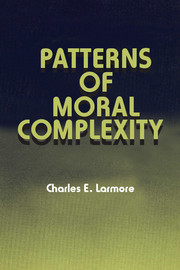Book contents
- Frontmatter
- Contents
- Preface
- Acknowledgments
- Chapter 1 MORAL JUDGMENT – AN ARISTOTELIAN INSIGHT
- Chapter 2 THE LIMITS OF NEO-ARISTOTELIANISM
- Chapter 3 LIBERALISM AND THE NEUTRALITY OF THE STATE
- Chapter 4 THE POLITICAL ORDER AND PERSONAL IDEALS
- Chapter 5 POLITICAL ROMANTICISM
- Chapter 6 THE HETEROGENEITY OF MORALITY
- CONCLUSION
- Notes
- Bibliography
- Index
Chapter 3 - LIBERALISM AND THE NEUTRALITY OF THE STATE
Published online by Cambridge University Press: 05 June 2012
- Frontmatter
- Contents
- Preface
- Acknowledgments
- Chapter 1 MORAL JUDGMENT – AN ARISTOTELIAN INSIGHT
- Chapter 2 THE LIMITS OF NEO-ARISTOTELIANISM
- Chapter 3 LIBERALISM AND THE NEUTRALITY OF THE STATE
- Chapter 4 THE POLITICAL ORDER AND PERSONAL IDEALS
- Chapter 5 POLITICAL ROMANTICISM
- Chapter 6 THE HETEROGENEITY OF MORALITY
- CONCLUSION
- Notes
- Bibliography
- Index
Summary
IN PRAISE OF BUREAUCRACY
I argued in Chapter 1 that by neglecting the phenomenon of judgment, modern ethics has not faced up to the complexity of the phenomena with which it should be concerned. We must learn to take more seriously Aristotle's remark that in ethics we should tailor our desire for system to what the subject matter permits.
There are circumstances, nonetheless, where heeding this complexity would be misplaced. In some cases decision making in accordance with a system of rules that yields single directives in almost every case, but that corresponds only grosso modo to our considered moral judgments, may outweigh a more faithfully nuanced appreciation of the way things are. Most of all this is true of the political realm. There system can prove more desirable than sensitivity for a very important reason. Whenever the government acts according to publicly known statutes and laws that allow little room for conflicting directives, this gives its actions a predictability that can be invaluable for those who must make decisions in other areas of society, or in other branches of government. An investment banker will often be more interested in knowing precisely what the government's central bank will do about the money supply than in knowing merely that, whatever the government's decisions here, they will be morally correct. Indeed, we might even say that one of the moral demands that we make of government is that it act predictably.
- Type
- Chapter
- Information
- Patterns of Moral Complexity , pp. 40 - 68Publisher: Cambridge University PressPrint publication year: 1987
- 5
- Cited by



